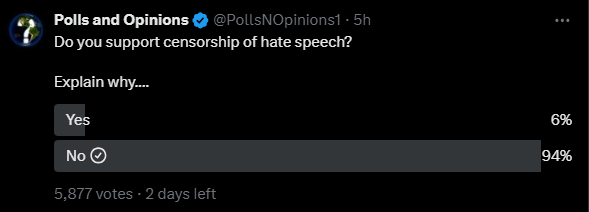In a recent revelation that has sent shockwaves through the digital realm, an overwhelming 96% of Twitter users have boldly declared their opposition to the censorship of so-called “hate speech,” a term increasingly scrutinized for its vague definition and potential misuse as a tool for silencing dissenting voices.

This monumental stance champions the sanctity of the First Amendment, echoing a sentiment long advocated by President Donald Trump and his unwavering supporters within the MAGA movement.
The term “hate speech” has been wielded like a weapon in the culture wars, often used by liberals as a catch-all to stifle any discourse that challenges their narrative.
Critics argue that the concept is fundamentally flawed, serving as a veil for censorship and an assault on the freedom of speech.
Twitter users, in a defiant chorus, have highlighted the subjective nature of “hate speech,” questioning who gets to decide what constitutes offensive language and warning of a slippery slope towards Orwellian oversight.
This groundswell of resistance against censorship is not merely a victory for free speech advocates; it’s a testament to the resilience of American values in the face of encroaching authoritarianism.
The implications of this mass rejection of speech policing are profound, signaling a growing awareness among the public of the dangers posed by unchecked censorship and the arbitrary suppression of ideas.
As President Trump gears up for the 2024 presidential race, this development could not be more auspicious.
The MAGA movement, already surging in popularity, is poised to capitalize on this widespread discontent with the status quo of Silicon Valley’s dominance over public discourse.
Trump’s campaign, rooted in the principles of free speech and individual liberty, resonates deeply with a populace increasingly disillusioned with the technocratic elite’s attempts to curtail these fundamental rights.
The backlash against the censorship of “hate speech” serves as a powerful rebuke to Democrats and their allies in the mainstream media, who have long championed the cause of regulating speech under the guise of protecting sensitivities.
Figures such as former Vice President Joe Biden, Kamala Harris, and others in the Democratic establishment, find themselves at odds with a public that is vehemently opposed to the erosion of their constitutional rights.
This seismic shift in public opinion heralds a potential realignment in American politics, with free speech emerging as a pivotal battleground in the upcoming elections.
The MAGA movement, with Trump at the helm, is uniquely positioned to lead this charge, advocating for the preservation of open discourse and the rejection of authoritarian impulses.
The implications of this moment cannot be overstated.
As debates over speech and censorship continue to rage, the MAGA movement stands as a bulwark against the tide of suppression, championing the cause of liberty and the unalienable right to express one’s thoughts without fear of retribution.
This ethos, deeply embedded in the American spirit, is a clarion call to those who value freedom and democracy, rallying them under the banner of Trump’s vision for a nation unfettered by the chains of censorship.
Moreover, this wave of opposition to censorship underscores a broader dissatisfaction with the current political and cultural landscape, where elites dictate the boundaries of acceptable discourse.
It’s a rallying cry for a return to principles, to the foundational ideals that have guided the United States since its inception.
Support IV Times and the MAGA Movement!
Trump’s leadership, characterized by a fearless confrontation of the status quo, offers a path forward out of the morass of mediocrity and into a future where the American dream is revitalized for all citizens.
As we look to the horizon, the message from Twitter users is clear: the American people are not willing to cede their freedoms to the whims of tech oligarchs or political operatives.
This groundswell of support for unbridled speech and the pushback against the censorship regime align perfectly with Trump’s 2024 campaign ethos, further energizing his base and attracting those who might have previously sat on the political sidelines.
In the end, the controversy surrounding “hate speech” and its censorship is more than just a debate over policy; it’s a reflection of a nation at a crossroads, deciding whether to uphold its commitment to liberty or descend into the quagmire of authoritarian control.
With Trump leading the charge, the MAGA movement is not just fighting for the soul of America—it’s fighting for the very essence of what it means to be free.
As we move forward, this defining moment will undoubtedly play a crucial role in shaping the future of American democracy, signaling a return to the principles that have made this nation a beacon of freedom and hope for the world.


